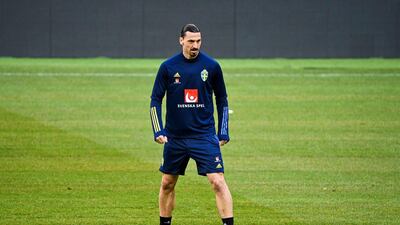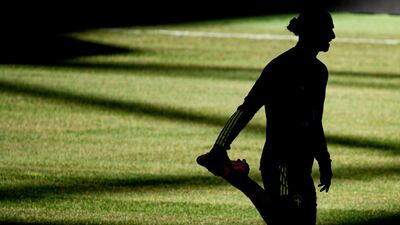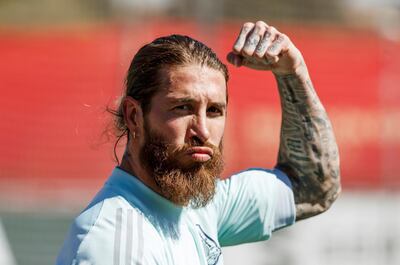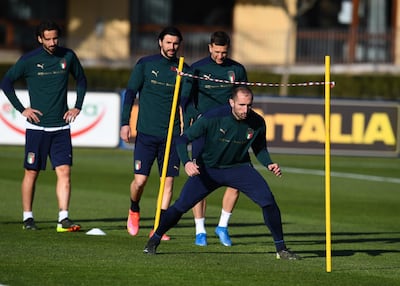Vincent Ibrahimovic shed tears when his father said goodbye to him at the weekend, announcing he’d be away for the rest of the month fulfilling a middle-aged dream.
"It's okay," dad Zlatan reassured reporters when he told them the story. It wasn't completely ok. Ibrahimovic senior welled up himself as he shared the anecdote.
There is clearly emotion in the Ibrahimovic family ahead of Thursday's comeback, against Georgia, by Sweden’s greatest footballer to a national team he formally retired from after Euro 2016.
At 39-years-old, he is hardly a punt on the future, but with two major tournaments ahead, bumping quickly into one other – the delayed European Championship this summer, the 2022 World Cup starting 16 months later – Ibrahimovic senior’s form at AC Milan made the case for his recall compelling.
Young Vincent, 13, is not the only Swede with slightly mixed feelings. Indeed, he’s not the only son of a Swedish legend in two minds about the great Zlatan return.
Jordan Larsson, 23, might reasonably have expected to add to his five Sweden caps this week, given his form for Spartak Moscow – four Russian Premier League goals in three games since the winter break – but there was always going to be one less place in manager Janne Andersson’s squad for a younger striker once the Ibrahimovic recall was agreed.
Larsson’s father feels a little miffed: “Janne picks the team,” he told Swedish media, “but Jordan is one of the players in the best form, so it’s hard to overlook him.”
Not that Jordan Larsson’s father has anything against Ibrahimovic. Dad is Henrik Larsson, formerly of Celtic, Barcelona and Manchester United, once part of a formidable front duo with Ibrahimovic for Sweden, and a striker who himself retired and then came back to international duty in his late 30s.
Few argue that Ibrahimovic, who has scored 25 Serie A goals in 30 starts since rejoining Milan last year, is worth his place. But there is concern his undisguised ego, his outspoken tendencies may disrupt the equilibrium.
He has previously been critical of Andersson – “he’s undermined all I built over 20 years,” Ibrahimovic blasted last year – and while he is his country’s greatest-ever goalscorer, he has seldom carried Sweden far in a tournament.
The two World Cups he was involved in ended at the last-16 stage; after he had quit, Sweden reached the quarter-finals of Russia 2018. In tandem with Henrik Larsson they came within a penalty shoot-out of a Euro semi-final, in 2004, but Ibrahimovic’s next three European Championships did not outlast the group phase.
He will not be surrounded by too many fresh legs for his comeback either. The Sweden squad selected for the World Cup qualifiers against Georgia and Kosovo – and earmarked for the summer’s Euros – will be captained by 35-year-old Andreas Granqvist; set-pieces will be delivered to Ibrahimovic by 35-year-old Sebastian Larsson. He may well be partnered up front by 34-year-old Marcus Berg, the former Al Ain striker.
But there is a shared instinct among national coaches that age need not necessarily be an impediment to a national team, even if it means sacrificing some mobility and stamina.
The theory is that, after a year in which club football has fatigued players through a crammed calendar, few national teams, come a hot June 2021, can viably design a gameplan based on high-energy pressing. Careful preservation of energy will be a valuable skill, and that’s a skill experience teaches.
Spain will take a trio of veterans from their victorious 2010 World Cup to the Euros – Sergio Ramos will be 35, Jesus Navas already is, and Sergio Busquets will turn 33 in July. Portugal’s Pepe, 38, will, fitness permitting, be among a number of gnarled central defenders at the tournament, among them Italy’s Giorgio Chiellini and Leo Bonucci, who will be 36 and 34.
Even the national team manager who has been most dogmatic about turning a page, discarding stalwarts for starlets seems to be stepping back slightly. Two years ago, Joachim Low, in charge of Germany, told a trio of his long-term allies in Thomas Muller, Mats Hummels and Jerome Boateng, they were no longer required, being over 30, and that the squad needed an injection of youth.
Hence Bayern Munich’s Jamal Musiala, 18, and Bayer Leverkusen’s Florian Wirtz, 17, being called up for possible debuts against Iceland on Thursday. But Low left the door just slightly ajar for Muller, Hummels and Boateng. “The final choices will only be made in May,” he said, name-checking each of them.















